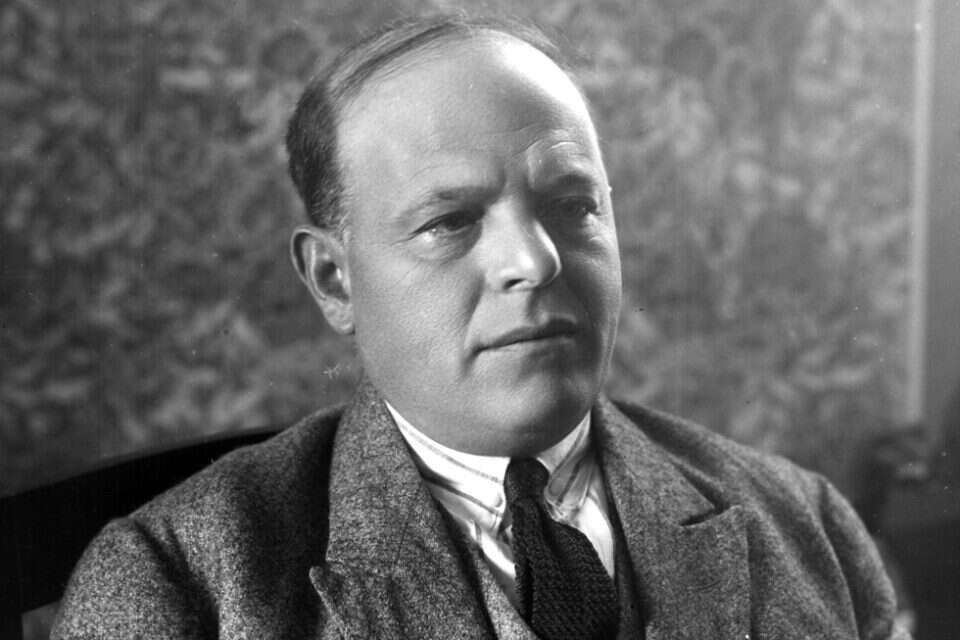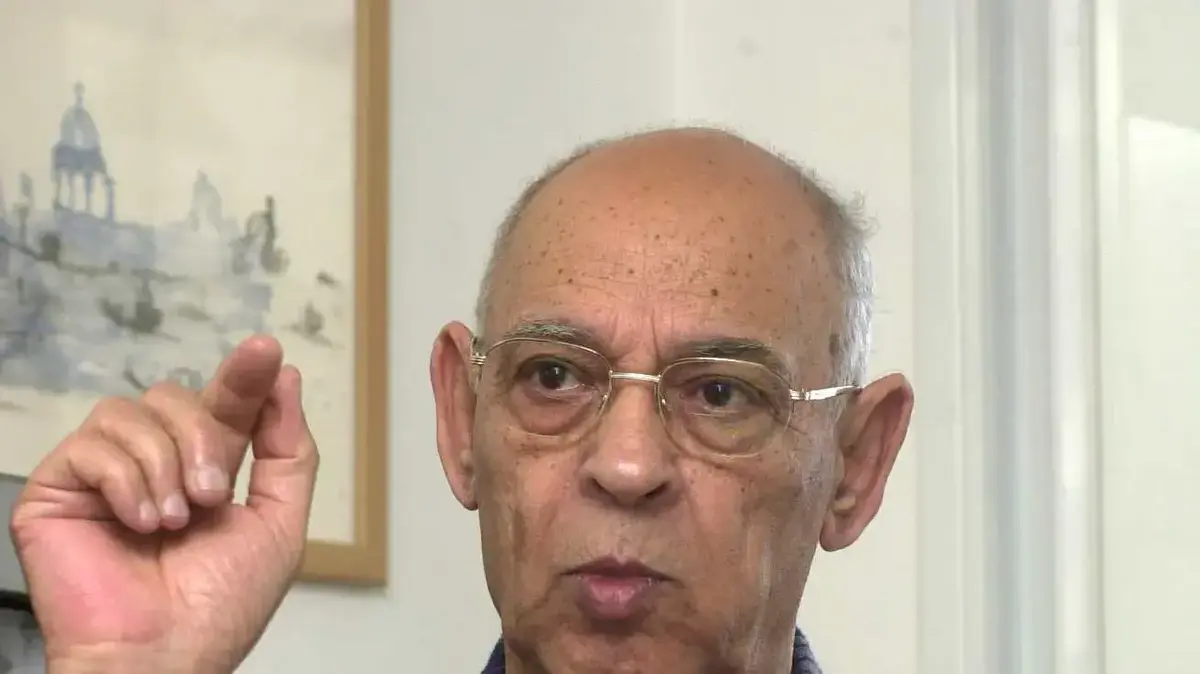The name Nitzan Zaira is often associated in the Israeli cultural consciousness with areas of music, production and providing a stage for singers of the type without whom they could possibly continue to operate in the local marginal areas.
The name and work of the founder of the "Nana Disc" label precedes him for several decades, and many tend to associate him with the Israeli rock'n'roll ethos - characterized by secular symbols and surrounded by a foreign aroma.
It would not be wrong to claim that Zaira, a man who founded legendary record stores to which he imported international records, is a link between Tel Aviv and the rest of the world, but to claim so is to ignore an important and significant part of his cultural work.
"Bialik's character has always fascinated me."
Nitzan Zaira, in 2020, photo: Yehoshua Yosef
In these very days, the 150th anniversary of the birth of Haim Nachman Bialik is being celebrated - a multidisciplinary cultural event that opened at the "Niganon Bedzedek" festival, born at the initiative of Zaira, who also artistically directs it.
Among the exhibition of paintings, films and tours of the city in the footsteps of the poet and the revival of the Hebrew language, the show "The Stars Cheated on Me" stood out in particular, which included performances of his songs by names such as Teddy Negusa, Shlomi Shaban and, as usual, Berry Sakharof - a man whose name is associated with that of Zaira and who in his work explores the work quite a bit The Hebrew that preceded it, as well as the religious worlds.
"The idea for the festival started from a song by Bialik that I produced for the 'Avoda Hebrew' project with Mosh Ben Ari, Filoni and Sakharoff," Zaira says. , as a result of which I realized that actually the person sitting on the window from the poem is Zionism, that actually these are two people with a very special relationship. On the one hand, there were strong objections to the development of the Hebrew language, and on the other hand, there was tremendous encouragement to do so. According to Rabbi Kook's thesis, the exile of Messiah ben Yosef must come before Mashiach ben David (according to the Sages, Mashiach ben Yosef is the first Messiah who will establish the practical stages of redemption, while Mashiach ben David will bring the Jewish people to their spiritual perfection, p.a.). If there is something that symbolizes Mashiach ben Yosef, this is Tel Aviv. A secular volume. I decided that such a festival should be established there, no matter how difficult it is."
Why is it difficult?
"The first thing is its very secular nature. The cultural institutions you want to collaborate with in Tel Aviv are secular, even doing a show by women for women alone is something that is impossible. From the religious side they look at you and say 'What do you want from us?', and also from the secular side They say that. In both cases, you are considered something not kosher, not acceptable. Worshiping or worshiping Hebrew culture or trying to develop it through Jewish roots is considered wrong from all sides. Not completely, I see that there is progress, but there is still a way to go."
What drew you to research Bialik?
"Bialik is a kind of prophet of the renewed Hebrew language. He has a tremendous literary work and is a very important poet. He mentored poets, and was one of Alexander Penn's mentors. Although they are from different generations, they were good friends. There was something prophetic in his activity with the Hebrew language His character has always fascinated me, but I didn't know how much he fascinates me until I began to take a deep interest in him and understand how unique he was. Just now in the show I asked Teddy Ngosa to handle the text of his last words, and it's just as if it was written today."
From the "Niganon Betzedek" festival, photo: Yuval Aral
For quite a few years now, Zaira has been promoting the Hebrew culture on its numerous branches, and especially its poets.
Already almost 25 years ago, he produced the well-known and successful covers project "Avoda Hebrew" (which won a popular sequel a decade later), alongside the production of tribute albums to the poet Rachel, as well as the show "Yehuda Halevi and Ibn Gvirol", in which singers such as Sakharof, Micha Sheetrit , Etti Ankri, Meir Banai, Avitar Banai and other big names composed and performed songs by the poets of the Golden Age in Spain.
A few years before, Zaira founded a label that dealt in original Jewish music, and through which artists such as Aharon Razel released albums.
He himself will tell you that already in the 70's he was in charge of Jewish projects with Shlomo Groenich, and also printed and sold cantorial albums.
Even if his name is not the first name that comes to mind when you think of the rise in popularity of Jewish music, he was definitely there as a connecting factor.
On the one hand, a clear sign of the importation of everything that can be considered diasporic rock, on the other - a man who has been active for years in the areas of Hebrew art and celebrates the meeting of secularism and religion within it.
How do you explain that with all your work, you still consciously and instinctively connect with people from more alternative areas, which correspond less with religious heritage?
"Who decided that rock is alternative and secular? Rock is actually a place where people dig into their depths and their desires to reach their essence. I've been working in music since the early 1960s, and I've met many people in it, from all sides of the field. If it's producers, If it's lyricists like Ehud Manor and Meir Ariel, composers, arrangers, music producers. Then I happened to come across quite a few people who talked about Hebrew, acted from it, or were interested in it. Some thought of themselves as language developers, some thought of themselves as language researchers. Others composed it , were interested in the rhythms of the word, some of them in rhyme and weighting. So I learned from all of them, and it's something I'm still trying to learn and develop."
Berry Sakharof, photo: Eldad Shoshan
Would you define what you do as the accessibility of a culture that needs to be perpetuated, using contemporary popular artists and tools?
"If there are ancient texts and they exist, then it is important for people to be able to reach them somehow. People came in droves to buy the album 'Adomim HaShephat' by Sakharof and Rae Mokhim, and they were exposed to old texts. People need to understand the picture: to call Ibn Gvirol this 'Rabbi' Not true because he is a poet. He was a punk. You have to understand that those poets, whether it's Yona Wallach, Alterman, Fenn or Bialik, themselves studied their Hebrewness and created in Hebrew for each of them their own Hebrewness. This made us correspond with our Hebrewness and our roots. It is important to me that we can To get to know this great literature. Our sources are something that occupies me and takes my time. In projects like this festival, I try to invest back into it with love."
The "Niganon Bedzedek" festival will be held until tomorrow (Friday) in Tel Aviv.
were we wrong
We will fix it!
If you found an error in the article, we would appreciate it if you shared it with us








/cloudfront-eu-central-1.images.arcpublishing.com/prisa/5V3BKLQGUFCGJNOFC3AELS4EEU.jpg)


/cloudfront-eu-central-1.images.arcpublishing.com/prisa/S7ERVSCT4FUVX6R7TUVBDNTH5Y.jpg)



